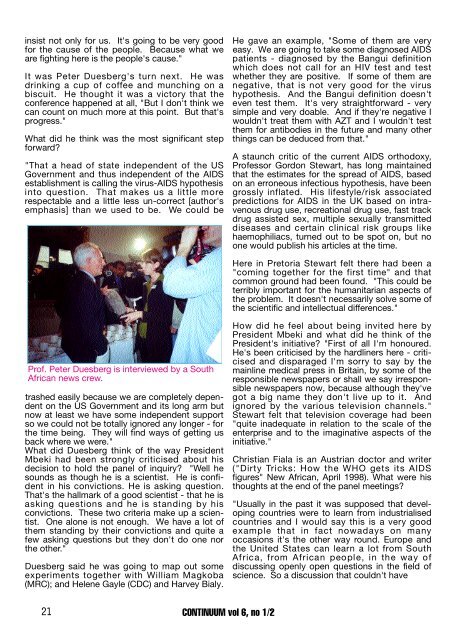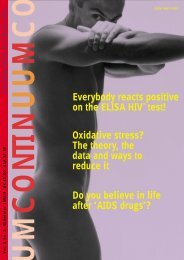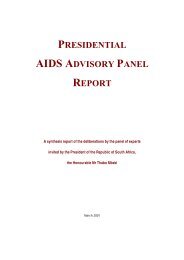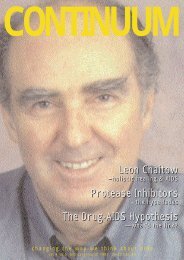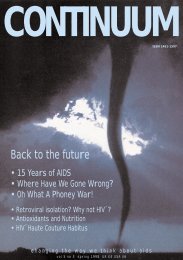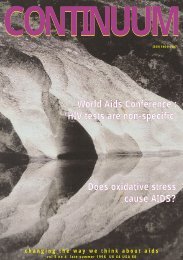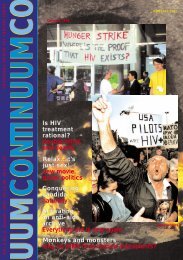AIDS post-HIV : beat of a different drummer - AltHeal
AIDS post-HIV : beat of a different drummer - AltHeal
AIDS post-HIV : beat of a different drummer - AltHeal
You also want an ePaper? Increase the reach of your titles
YUMPU automatically turns print PDFs into web optimized ePapers that Google loves.
insist not only for us. It's going to be very good<br />
for the cause <strong>of</strong> the people. Because what we<br />
are fighting here is the people's cause."<br />
It was Peter Duesberg's turn next. He was<br />
drinking a cup <strong>of</strong> c<strong>of</strong>fee and munching on a<br />
biscuit. He thought it was a victory that the<br />
conference happened at all, "But I don't think we<br />
can count on much more at this point. But that's<br />
progress."<br />
What did he think was the most significant step<br />
forward<br />
"That a head <strong>of</strong> state independent <strong>of</strong> the US<br />
G o v e rnment and thus independent <strong>of</strong> the <strong>AIDS</strong><br />
establishment is calling the virus-<strong>AIDS</strong> hypothesis<br />
into question. That makes us a little more<br />
respectable and a little less un-correct [author's<br />
emphasis] than we used to be. We could be<br />
He gave an example, "Some <strong>of</strong> them are very<br />
easy. We are going to take some diagnosed <strong>AIDS</strong><br />
patients - diagnosed by the Bangui definition<br />
which does not call for an <strong>HIV</strong> test and test<br />
whether they are positive. If some <strong>of</strong> them are<br />
negative, that is not very good for the virus<br />
hypothesis. And the Bangui definition doesn't<br />
even test them. It's very straightforward - very<br />
simple and very doable. And if they're negative I<br />
wouldn't treat them with AZT and I wouldn't test<br />
them for antibodies in the future and many other<br />
things can be deduced from that."<br />
A staunch critic <strong>of</strong> the current <strong>AIDS</strong> orthodoxy,<br />
P r<strong>of</strong>essor Gordon Stewart, has long maintained<br />
that the estimates for the spread <strong>of</strong> <strong>AIDS</strong>, based<br />
on an erroneous infectious hypothesis, have been<br />
g rossly inflated. His lifestyle/risk associated<br />
p redictions for <strong>AIDS</strong> in the UK based on intravenous<br />
drug use, recreational drug use, fast track<br />
drug assisted sex, multiple sexually transmitted<br />
diseases and certain clinical risk groups like<br />
haemophiliacs, turned out to be spot on, but no<br />
one would publish his articles at the time.<br />
H e re in Pretoria Stewart felt there had been a<br />
"coming together for the first time" and that<br />
common ground had been found. "This could be<br />
terribly important for the humanitarian aspects <strong>of</strong><br />
the problem. It doesn't necessarily solve some <strong>of</strong><br />
the scientific and intellectual differences."<br />
Pr<strong>of</strong>. Peter Duesberg is interviewed by a South<br />
African news crew.<br />
trashed easily because we are completely dependent<br />
on the US Government and its long arm but<br />
now at least we have some independent support<br />
so we could not be totally ignored any longer - for<br />
the time being. They will find ways <strong>of</strong> getting us<br />
back where we were."<br />
What did Duesberg think <strong>of</strong> the way Pre s i d e n t<br />
Mbeki had been strongly criticised about his<br />
decision to hold the panel <strong>of</strong> inquiry "Well he<br />
sounds as though he is a scientist. He is confident<br />
in his convictions. He is asking question.<br />
That's the hallmark <strong>of</strong> a good scientist - that he is<br />
asking questions and he is standing by his<br />
convictions. These two criteria make up a scientist.<br />
One alone is not enough. We have a lot <strong>of</strong><br />
them standing by their convictions and quite a<br />
few asking questions but they don't do one nor<br />
the other."<br />
D u e s b e rg said he was going to map out some<br />
experiments together with William Magkoba<br />
(MRC); and Helene Gayle (CDC) and Harvey Bialy.<br />
How did he feel about being invited here by<br />
P resident Mbeki and what did he think <strong>of</strong> the<br />
P resident's initiative "First <strong>of</strong> all I'm honoure d .<br />
He's been criticised by the hardliners here - criticised<br />
and disparaged I'm sorry to say by the<br />
mainline medical press in Britain, by some <strong>of</strong> the<br />
responsible newspapers or shall we say irresponsible<br />
newspapers now, because although they've<br />
got a big name they don't live up to it. And<br />
i g n o red by the various television channels."<br />
Stewart felt that television coverage had been<br />
"quite inadequate in relation to the scale <strong>of</strong> the<br />
enterprise and to the imaginative aspects <strong>of</strong> the<br />
initiative."<br />
Christian Fiala is an Austrian doctor and writer<br />
("Dirty Tricks: How the WHO gets its <strong>AIDS</strong><br />
figures" New African, April 1998). What were his<br />
thoughts at the end <strong>of</strong> the panel meetings<br />
"Usually in the past it was supposed that developing<br />
countries were to learn from industrialised<br />
countries and I would say this is a very good<br />
example that in fact nowadays on many<br />
occasions it's the other way round. Europe and<br />
the United States can learn a lot from South<br />
Africa, from African people, in the way <strong>of</strong><br />
discussing openly open questions in the field <strong>of</strong><br />
science. So a discussion that couldn't have<br />
21<br />
CONTINUUM vol 6, no 1/2


